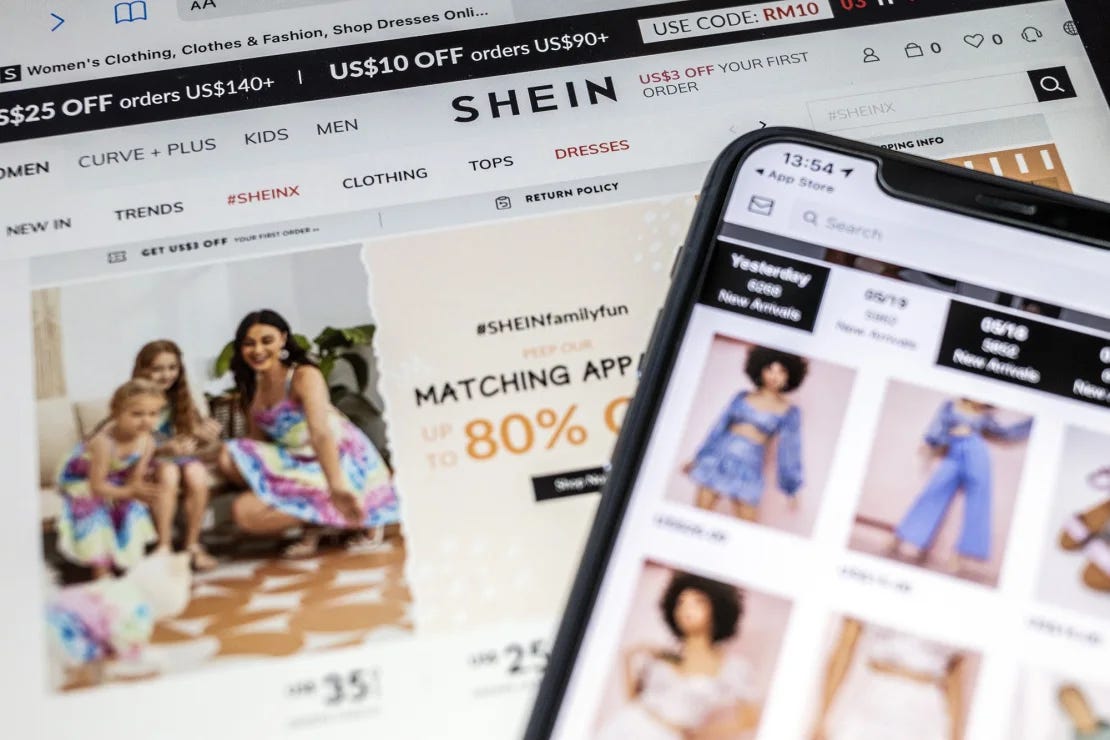Public Health Policy Reviews 21:
Is the recent controversy surrounding “SHEIN” a manifestation of the ongoing US-China trade war?
Celebrity musician Katy Perry gave a speech at a Shein event in May 2020. Photo image courtesy of Shein.
American President Joe Biden made a significant economic policy move yesterday, imposing $18 billion in new tariffs on Chinese imports.
The new tariffs specifically affect Chinese imports of electric vehicles, advanced batteries, solar cells, steel, aluminum, and medical equipment. The tariffs also escalate a trade war between the two international economic juggernauts, underscoring current economic and diplomatic tensions with China.
Mr. Biden is attempting to politically “outflank” former US President Donald Trump on trade and economic issues. Mr. Trump consistently received high marks from American business leaders and the media for his hardline policy positions on trade while in office from 2017 to 2020.
Biden used the announcement of the tariffs in the White House Rose Garden as an opportunity to attack Chinese international trade policies he deemed “unfair.” “American workers can outwork and outcompete anyone as long as the competition is fair,” Biden said.
How is international trade policy connected to public health policy in the complex interplay of international business between the US and China?
**********
Photo images of the Shein electronic app courtesy of Justin Chin, Bloomberg/Getty Images.
Interestingly, on Monday, the US National Retail Federation also rejected the membership application of Chinese “fast fashion” retailer Shein.
As of 2022, Shein is the world’s largest fashion retailer. Chinese entrepreneur Chris Xu founded the company in Nanjing, China, in October 2008. Media reports emerged earlier this week that Shein has failed to resolve chronic human rights abuses of workers in the retailer’s supply chain.
Public Eye, a non-governmental (NGO) human and environmental rights advocacy group based in Switzerland, claims to know of continued violations of workers’ rights at companies associated with Shein. Despite Shein’s 2022 commitment to change its modus operandi, Public Eye says that some workers at Chinese factories that supply Shein still work 75-hour weeks.
Jeanine Ballone, the Executive Director at Fashion 4 Development, said – “The reality that employees work from early morning until late at night with minimal breaks and only one day off per month is unacceptable and inhumane.”
**********
American singer, songwriter, and dancer Tinashe at a Shein event in Los Angeles, California, in 2021. Photo image courtesy of Shein.
Shein told CNN it does “not recognize many of the allegations in Public Eye’s report.”
President Biden and US business regulators view Shein as threatening American retail companies. Chinese manufacturers have traditionally sold their products to American consumers on web portals like Amazon.com and Walmart’s electronic market platform.
However, the rise of large e-market companies in China, similar to Amazon.com, is reshaping the landscape of international commerce. Shein, Temu, and other Chinese retailers increasingly sell and market directly to American consumers. Unfortunately, Chinese companies sometimes also sell inexpensive “knock-off” versions of luxury and high-end merchandise that can look remarkably similar to brand-name products.
The rapid growth of Chinese companies like Shein in the US markets not only threatens American retail businesses. The liberal US labor laws and union protections will also be at risk. Hence, we argue that international business will continue to pose challenges to American workers in terms of public health policy.
**********
Photo by Manny Becerra on Unsplash.
In their statement to the media, Public Eye said, “After deducting overtime, the wages at Shein amount to $332 per month—well below some calculations of what represents a living wage in China.”
Joe Biden touts himself as a “pro-union” President. So, the prospect of Chinese companies entering the US market and depressing labor wages should be a significant issue for Biden.
But President Biden is rapidly losing support from the left wing of the Democratic Party base because of his unabashed support for Israeli military atrocities against the civilian population of Gaza. Arab American and Muslim-American support for the President has “fallen off a cliff.”
Statistical support for Biden from Arab and Muslim voters cratered over the past seven (7) months, from 59% to 17%. That is a 42% statistical decrease in voter support from Mr. Biden since 2020.
Joe Biden would not have won the electoral college in 2020 without the support of Arab and Muslim voters in Michigan.
**********
A 2020 US Electoral College Map. Photo by Clay Banks on Unsplash.
In recent national polling, Donald Trump also beats Joe Biden amongst young voters by 4%.
Consequently, Biden attempts to adopt critical economic and diplomatic policy issues from Mr. Trump. In December 2016, Trump began his administrative transition with a surprise call to Taiwanese President Tsai Ing-wen.
This symbolic act departed from the Obama administration’s reluctance to risk upsetting China over Taiwan’s independence from 2008 through 2016. As President, Trump launched a trade war against China, classified the country as a manipulator of foreign currency, punished China with sanctions for alleged ties to Iran, and increased visa restrictions on Chinese students and scholars.
In 2017, the President resumed US Navy training and navigation operations with Taiwan in the South China Sea. In addition, Trump imposed tariffs on Chinese goods in 2018, which led to an escalating “war of words” over trade and intellectual property issues between his administration and Chinese officials.
**********
Image by Alyn from Pixabay.
President Trump repeatedly accused China of taking unfair advantage of the US in cybersecurity, intellectual property, and trade.
Like with Russia — US national security officials, intelligence officers, and computer forensic specialists alleged the Chinese government hacked and spied on American government computer systems. There is ample evidence to support the Chinese’s widespread “hacking” of American telecommunication servers and devices.
China’s purpose in the electronic breaches against the US was government spying, electronic “warfare,” corporate and technological trade secrets, and intellectual property and digital content theft.
The Trump administration’s most aggressive security move was to tighten restrictions on the Chinese multinational technology company Huawei. The overarching aim was to prevent Huawei from accessing crucial components of US technology.
“We don’t want their equipment in the United States because they spy on us,” Trump said in an August 17th, 2020, interview on Fox News. “And any country that uses it (Huawei equipment), we’re not going to do anything in terms of sharing intelligence,” continued President Trump.
**********
Photo by visuals on Unsplash.
Ironically, former President Trump praised Chinese President Xi Jinping and his government’s expertise in international trade agreements.
However, those sentiments changed when Mr. Trump began seeking to shift blame for his poor management of the COVID-19 pandemic away from himself.
When current President Joe Biden slapped the new tariffs on China Tuesday, he adopted Trump’s strategy of increasing friction between the US and the world’s second-largest economy. “But for too long, it hasn’t been fair. For years, the Chinese government has poured state money into Chinese companies ... it’s not competition, it’s cheating,” said Biden.
As the wildly popular music, dance, and video app TikTok faces a ban because a Chinese company owns it, Temu is backing out of a plan to enter the US market.










